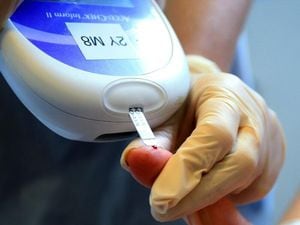Health bosses in Shropshire issue warning over diabetes
Health bosses in Shropshire are encouraging residents to not delay contacting their GP practice if they become aware of any signs and symptoms of diabetes.

Type one is where the body’s immune system attacks and destroys the cells that produce insulin.
Type two is the more common form of diabetes, which is where the body does not produce enough insulin or the body’s cells don’t react to insulin.
The main symptoms of diabetes can be remembered as the Four Ts – going to the toilet a lot, being really thirsty and not being able to quench the thirst, feeling more tired than usual and losing weight or looking thinner than usual.
Other symptoms can include genital itching or thrush, cuts and wounds that take longer to heal and blurred vision.
Dr Julian Povey, chair of Shropshire Clinical Commissioning Group and local GP, said: “Why people get diabetes is complex and not always clear but some factors can increase your risk of developing it, from genetics and ethnic background to gender, age and lifestyle.
“Both type one and type two diabetes are equally serious and the condition can cause major complications such as strokes and heart disease, so it’s important to be aware of the symptoms and to contact your GP practice if you have any concerns.”
Dr Jo Leahy, chair of Telford and Wrekin CCG and local GP, said: “Regardless of what type of diabetes you have, you are no more likely to catch coronavirus than anyone else.
"The majority of people who do get coronavirus, whether they have diabetes or not, will have mild symptoms and won’t need to go into hospital.
“However, if you have diabetes and catch coronavirus, you will be vulnerable to developing a severe illness, but the way it affects you can vary from person to person.
"This is why it’s so important to stay alert, practice social distancing and keep on top of your medications.”
Diabetes UK has set up a diabetes helpline on 0345 123 2399, which is open Monday to Friday, 9am to 6pm, providing specialist advice on all aspects of living with diabetes.
For more information about diabetes visit the NHS website at www.nhs.uk/conditions/diabetes





